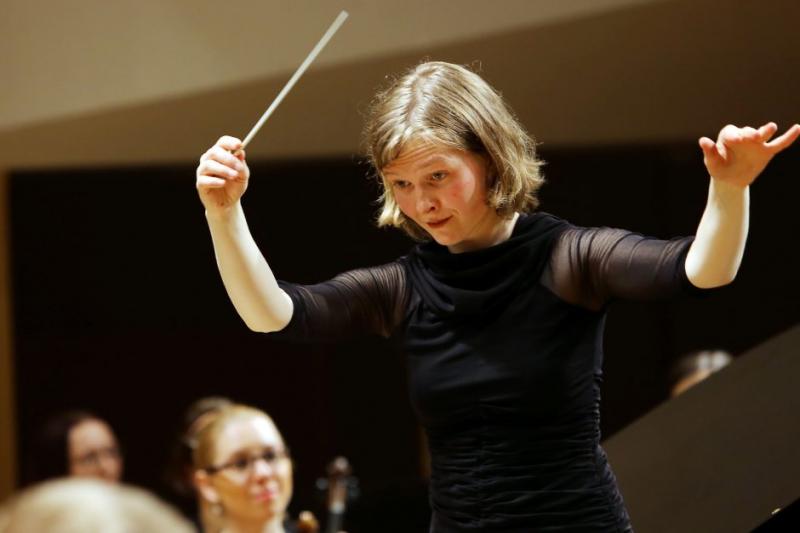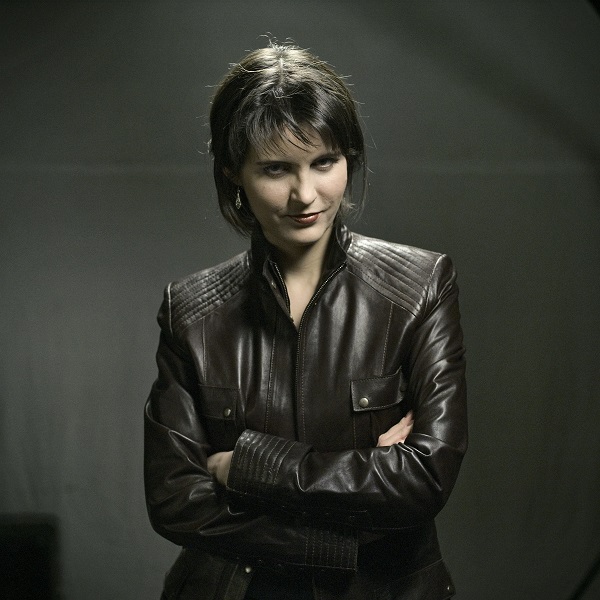CBSO, Gražinytė-Tyla, Symphony Hall Birmingham | reviews, news & interviews
CBSO, Gražinytė-Tyla, Symphony Hall Birmingham
CBSO, Gražinytė-Tyla, Symphony Hall Birmingham
Head and heart triumph together in Mahler, Haydn and a UK premiere

Is there anything on a concert programme more guaranteed to make the heart lift – or to prove that a conductor has their musical priorities straight – than a Haydn symphony? If you're tired of Haydn, you're tired of life: there’s no music more joyous, more inventive or more resistant to vanity. Mirga Gražinytė-Tyla chose his Symphony No 6 of 1761, called Le Matin for its opening sunrise and the freshness of its ideas, and it was a delight.
The six wind players stood up to play, and the CBSO strings were slimmed down a little, but not a lot. There was no serious attempt here to fake a period style; indeed, Gražinytė-Tyla seemed to be enjoying the forces at her disposal, revelling in her ability to unleash a big, full-bodied burst of string sound in a tutti, and encouraging her woodwinds and string principals to play out like soloists in a concerto grosso. Tempos were brisk but not frantic, and Haydn’s dynamic surprises and wonderfully varied colours – flute melodies, carolling horns, and the wood-smokey blend of cellos, basses and a warbling solo bassoon in the third movement’s central Trio section – made their mark with the lightest of touches. It was bright, it was playful, and above all it felt affectionate. Gražinytė-Tyla, having made her artistic choices, owned them with warmth and style: a point beautifully made. For every hundred conductors who can bring the house down with Mahler, only a handful can make Haydn sing like this.
She sees the whole symphony as a single cumulative sweep
Of course, Gražinytė-Tyla can do Mahler too. The second half of this concert comprised his First Symphony, though this won’t have been the only reason why Symphony Hall was packed (there weren’t even any empty seats in the choirstalls). This was Gražinytė-Tyla’s first concert as music director of the CBSO since her debut programme at this summer's BBC Proms; her first week-night programme in the orchestra’s main season, then, and Birmingham’s first taste of what – hopefully – will be business as usual for the next few years.
So if she planned it as a statement of artistic intent, it was an encouraging one, and not just because of the Haydn. Her predecessor Andris Nelsons often gave the impression that he was conducting contemporary music under duress. Gražinytė-Tyla, in contrast, opened with the UK premiere of Fires, a 10-minute squib (when did it become unacceptable to call an overture an overture?) by the Lithuanian composer Raminta Šerkšnyte (pictured below). A misterioso introduction erupts in thunderous, racing ostinati, while excited clarinet squawks and bluesy sighs from muted trombone hint at a slyly subversive creative personality that might well be worth investigating further. Gražinytė-Tyla charged it with a bristling, glinting energy, and the final punchline – a quote from Beethoven’s Fifth – drew laughter. As for the Mahler: if you thought there was nothing left for anyone to say about this most overplayed of warhorses, the huge scope and sheer control of Gražinytė-Tyla’s interpretation will have shaken up quite a few preconceptions. The first movement doesn’t have to resemble an introduction and sonata-allegro, of course, but I’ve never heard it played quite so persuasively as a single enormous prelude. Gražinytė-Tyla let the massive stillness of the opening bars overflow and seep into every part of the movement; only with the jubilant horn whoops at the climax of the recapitulation did all that pent-up longing finally run off the leash – ecstatically. And then onwards, sustaining that momentum: into an earthy scherzo that turned into a whirling, horn-driven vortex, and then that macabre fairy-tale funeral of a slow movement, with the opening bass solo played in a hushed unison by all eight CBSO basses.
As for the Mahler: if you thought there was nothing left for anyone to say about this most overplayed of warhorses, the huge scope and sheer control of Gražinytė-Tyla’s interpretation will have shaken up quite a few preconceptions. The first movement doesn’t have to resemble an introduction and sonata-allegro, of course, but I’ve never heard it played quite so persuasively as a single enormous prelude. Gražinytė-Tyla let the massive stillness of the opening bars overflow and seep into every part of the movement; only with the jubilant horn whoops at the climax of the recapitulation did all that pent-up longing finally run off the leash – ecstatically. And then onwards, sustaining that momentum: into an earthy scherzo that turned into a whirling, horn-driven vortex, and then that macabre fairy-tale funeral of a slow movement, with the opening bass solo played in a hushed unison by all eight CBSO basses.
In terms of Gražinytė-Tyla’s overall vision, that made perfect sense. It was clear by now that she sees the whole symphony as a single cumulative sweep. A sudden lurch to a solo instrument, at this point in the proceedings, would have undercut the depth of tone in which that vision was grounded. (It would be fascinating to hear her in Bruckner). Meanwhile the drama of her finale made good on everything that had been held back so far. Put like that, it sounds coolly logical; in fact, there’s an incredibly vivid and tactile quality to the sound Gražinytė-Tyla draws from her new orchestra. Pianissimo passages were taut and tremulous with contained rapture, and the strings surged over the peak of Mahler’s great central melody in an ardent, blazing swell of emotion. Mahler for the head or for the heart? Gražinytė-Tyla makes no distinction.
rating
Explore topics
Share this article
Add comment
The future of Arts Journalism
You can stop theartsdesk.com closing!
We urgently need financing to survive. Our fundraising drive has thus far raised £33,000 but we need to reach £100,000 or we will be forced to close. Please contribute here: https://gofund.me/c3f6033d
And if you can forward this information to anyone who might assist, we’d be grateful.

Subscribe to theartsdesk.com
Thank you for continuing to read our work on theartsdesk.com. For unlimited access to every article in its entirety, including our archive of more than 15,000 pieces, we're asking for £5 per month or £40 per year. We feel it's a very good deal, and hope you do too.
To take a subscription now simply click here.
And if you're looking for that extra gift for a friend or family member, why not treat them to a theartsdesk.com gift subscription?
more Classical music
 Sheku Kanneh-Mason, Isata Kanneh-Mason, Wigmore Hall review - family fun, fire and finesse
Intimacy and empathy in a varied mixture from the star siblings
Sheku Kanneh-Mason, Isata Kanneh-Mason, Wigmore Hall review - family fun, fire and finesse
Intimacy and empathy in a varied mixture from the star siblings
 Mahler 8, LPO, Gardner, RFH review - lights on high
Perfect pacing allows climaxes to make their mark – and the visuals aren’t bad, either
Mahler 8, LPO, Gardner, RFH review - lights on high
Perfect pacing allows climaxes to make their mark – and the visuals aren’t bad, either
 Philharmonia, Alsop, RFH / Levit, Abramović, QEH review - misalliance and magical marathon
Kentridge’s film for Shostakovich 10 goes its own way, but a master compels in his 13th hour of Satie
Philharmonia, Alsop, RFH / Levit, Abramović, QEH review - misalliance and magical marathon
Kentridge’s film for Shostakovich 10 goes its own way, but a master compels in his 13th hour of Satie
 Bach St John Passion, Academy of Ancient Music, Cummings, Barbican review - conscience against conformism
In an age of hate-fuelled pile-ons, Bach's gospel tragedy strikes even deeper
Bach St John Passion, Academy of Ancient Music, Cummings, Barbican review - conscience against conformism
In an age of hate-fuelled pile-ons, Bach's gospel tragedy strikes even deeper
 MacMillan St John Passion, Boylan, National Symphony Orchestra & Chorus, Hill, NCH Dublin review - flares around a fine Christ
Young Irish baritone pulls focus in blazing performance of a 21st century classic
MacMillan St John Passion, Boylan, National Symphony Orchestra & Chorus, Hill, NCH Dublin review - flares around a fine Christ
Young Irish baritone pulls focus in blazing performance of a 21st century classic
 Classical CDs: Romance, reforestation and a Rolleiflex
New music for choir, orchestra and string quartet, plus a tribute to a rediscovered photographer
Classical CDs: Romance, reforestation and a Rolleiflex
New music for choir, orchestra and string quartet, plus a tribute to a rediscovered photographer
 First Person: St John's College choral conductor Christopher Gray on recording 'Lament & Liberation'
A showcase for contemporary choral works appropriate to this time
First Person: St John's College choral conductor Christopher Gray on recording 'Lament & Liberation'
A showcase for contemporary choral works appropriate to this time
 Donohoe, RPO, Brabbins, Cadogan Hall review - rarely heard British piano concerto
Welcome chance to hear a Bliss rarity alongside better-known British classics
Donohoe, RPO, Brabbins, Cadogan Hall review - rarely heard British piano concerto
Welcome chance to hear a Bliss rarity alongside better-known British classics
 London Choral Sinfonia, Waldron, Smith Square Hall review - contemporary choral classics alongside an ambitious premiere
An impassioned response to the climate crisis was slightly hamstrung by its text
London Choral Sinfonia, Waldron, Smith Square Hall review - contemporary choral classics alongside an ambitious premiere
An impassioned response to the climate crisis was slightly hamstrung by its text
 Goldberg Variations, Ólafsson, Wigmore Hall review - Bach in the shadow of Beethoven
Late changes, and new dramas, from the Icelandic superstar
Goldberg Variations, Ólafsson, Wigmore Hall review - Bach in the shadow of Beethoven
Late changes, and new dramas, from the Icelandic superstar
 Mahler's Ninth, BBC Philharmonic, Gamzou, Bridgewater Hall, Manchester review - vision and intensity
A composer-conductor interprets the last completed symphony in breathtaking style
Mahler's Ninth, BBC Philharmonic, Gamzou, Bridgewater Hall, Manchester review - vision and intensity
A composer-conductor interprets the last completed symphony in breathtaking style
 St Matthew Passion, Dunedin Consort, Butt, Queen’s Hall, Edinburgh review - life, meaning and depth
Annual Scottish airing is crowned by grounded conducting and Ashley Riches’ Christ
St Matthew Passion, Dunedin Consort, Butt, Queen’s Hall, Edinburgh review - life, meaning and depth
Annual Scottish airing is crowned by grounded conducting and Ashley Riches’ Christ

Comments
I have attended CBSO concerts